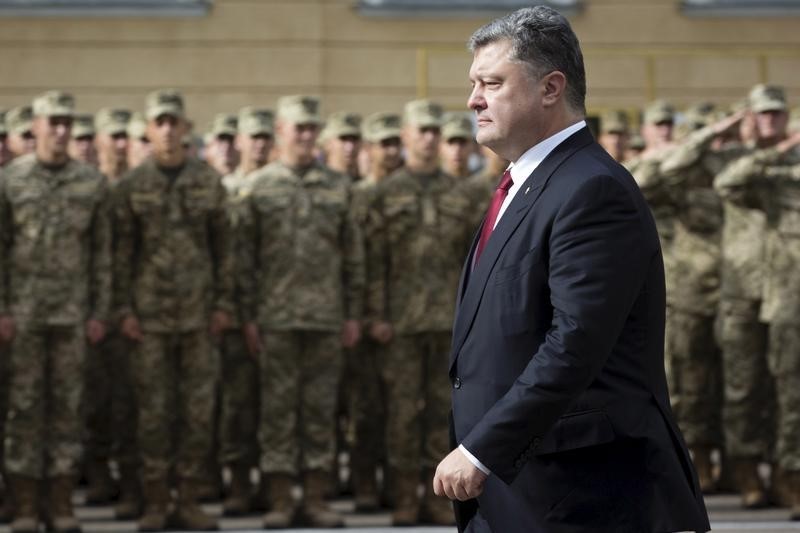(Bloomberg) -- Ukraine’s suggestion that it may impose martial law in reaction to Russia firing on its navy is raising concern that the step could affect everything from next year’s elections to the disbursement of billions of dollars of international aid.
President Petro Poroshenko’s call for parliament to debate the measure Monday drew immediate criticism from opposition forces at home who see it as an attempt to delay March’s presidential ballot. Poroshenko, who won a thumping first-round vote victory in 2014 after Russia annexed Crimea and fomented a war on Ukraine’s eastern flank, has since seen his popularity plunge.
“The introduction of martial law across Ukraine would be an excellent opportunity to manipulate presidential elections and, if necessary, apply some elements of dictatorship,” Oksana Syroyid, a lawmaker from the Samopomich party who’s also parliament’s deputy speaker, said on Facebook (NASDAQ:FB).
While a legislator from Poroshenko’s party said martial law wouldn’t automatically postpone the presidential election, Oleh Lyashko, the populist leader of the Radical Party, agreed with Syroyid. In a nation that experienced its second revolution in 10 years in 2014, canceling the presidential vote could spark another “popular uprising in the streets,” he said on Facebook.
At a hastily convened overnight session, Ukraine’s National Security and Defense Council proposed introducing martial law for 60 days after six servicemen were injured and three ships seized by Russia in the Kerch Strait near Crimea. Parliament will debate the measure at 4 p.m. Monday in Kiev,the capital.
IMF ‘Consequences’?
Officials were keen to downplay the implications for everyday life, saying things like banking operations would be unaffected.
But there was also uncertainty over how aid from the International Monetary Fund may be impacted by martial law, a step that was rejected even during the peak of hostilities between Ukraine and Russia before a long-term truce was signed three years ago.
The measure “could carry consequences with the IMF,” Eurasia Group said in an emailed note. “Western governments’ support has hinged on the Ukrainian government avoiding provocative actions that risk derailing the 2015 Minsk peace plan, and the IMF assumed status quo in the conflict when devising the current loan program.”
Yield Spike
With emerging markets like Turkey facing pressure from investors in recent months, maintaining cooperation with the IMF is key to Ukraine’s financial wellbeing. The government had been racing to receive a tranche of as much as $1.5 billion by year-end.
Martial law wouldn’t be an obstacle to IMF assistance, according to two people familiar with the matter who asked not to be identified. The Washington-based lender will release a statement later Monday.
Whatever happens with the IMF, the specter of martial law didn’t appear to reassure investors, who sent yields on Ukrainian dollar bonds due 2028 to the highest since they were sold last month.
While Ukraine is pushing for further sanctions against Russia over the naval incident, it may also be hoping the analysis by Danske Bank that the upswing in tensions is a “one- to two-day story” is accurate.
